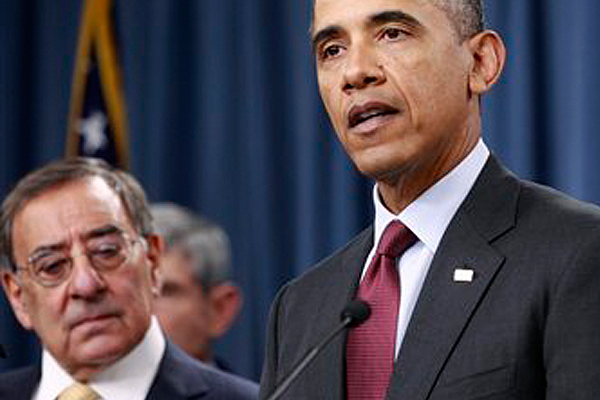In a presentation at the Pentagon Thursday, President Obama announced the results of a “comprehensive defense review” and some hints about how a proposed $487 billion in cuts over the next decade might be made.
Republicans quickly blasted Obama’s initiative as “dangerous,” with columnist Charles Krauthammer calling the plan “a road map to American decline.”
But are the proposed cuts really all that drastic? For an answer to that question and an explanation of how cuts might — or might not — ultimately be made, I spoke to Bill Hartung, director of the Arms and Security Project at the Center for International Policy.
Can you give the quick broad overview of what Obama actually announced yesterday in terms of the size of the military and its budget?
Going back to when Bob Gates was still secretary of defense, they started out talking about cuts of less than $100 billion over five years. At the meeting this week they talked about $487 billion over 10 years. But that’s against what the Pentagon would like to spend, not against what they’re spending now; and they had quite ambitious plans for increases. As President Obama pointed out, this new plan would basically slow the rate of increase. Given that we’re at the highest spending level since World War II, there shouldn’t be as much of an uproar as there has been in Congress. I think a lot of it is just turf wars protecting bureaucracies and contracts.
What is the current level of spending and how will the announcement this week affect it?
We’re in the range of $530 billion per year for the Pentagon itself. That’s not counting the wars, which are now around $120 billion extra per year. We had been up around $700 billion for the two things combined, but now we’re drifting down because of the pullout from Iraq. The announcement this week centered on the same cuts number they have been talking about for a while. It’s in line with what was required under a deal struck with Congress last summer as part of increasing the debt ceiling. This proposal is looking at, “how do we have to change missions, force structure, and strategy?” They said they were going to get rid of Cold War-era weapons systems and they are going to focus on cyber-security and drones and advanced communications. But particular details of what’s being cut will be revealed when the budget comes out in a few weeks.
The plan was criticized pretty widely by Republicans in Congress as “dangerous.” Is this something that Congress will have to approve?
The budget will get slugged out year to year. So Obama can say, “This is what we’d like over 10 years,” but that to some degree is just a wish and a promise. There will be push-back, especially from some of the conservative Republicans. People like Buck McKeon, chair of the House Armed Services Committee, have been very active pushing against cuts. Democrats with defense plants and military bases in their district will also want to protect their piece of the pie, as well.
Why is Obama doing this?
I think the primary reason for the initiative is the budget deficit. There’s a sense that you can’t really slash domestic programs and rearrange Medicare — and possibly even Social Security — if the Pentagon is not at least on the table. That was recommended by the president’s deficit reduction commission led by Alan Simpson and Erskine Bowles. It seemed like it was sort of getting lost, but when the deficit fight heated up and there were promises made when the debt ceiling was lifted over the summer, it became almost a necessity for Obama to come up with a plan along these lines. There’s an understanding that the military budget can’t go up forever. It had gone up 12 years in a row going back to the late 1990s. That had never happened before, even during Vietnam or Korea. There would be five or six years of increases and then the budget would start going down.
Are the numbers they are talking about significant? Or is it more of a trimming?
I’d like to see them go to about double the current plan. That would still be quite a bit smaller than reductions done after Vietnam or the Cold War. With Iraq and Afghanistan winding down, with the deficit problem, with the recent extraordinary increases in the military budget, it would be reasonable to cut deeper. I think there’s room to do that without major changes to U.S. commitments around the world. The industry is going to see Obama’s initiative as a big deal because they were basing their plans on certain levels of growth. So there will be trimming of certain weapon systems; there will be reductions in numbers of troops; and they will probably change the benefits for troops and retirement money and so on. If you’re a beneficiary of this money, it seems like a big deal. But if you look at it historically and in terms of the defense needs of the country, I think we could go a lot further.
Where does Mitt Romney stand on this?
He’d like to go higher than where we are now. Of course he doesn’t explain how he’s going to pay for this if he’s also trying to reduce the deficit and not raise taxes. He has talked about 4 percent of gross domestic product as a constant level of spending on the Pentagon; that would be almost like an entitlement program, where the Pentagon would get a set amount regardless of what’s going on in the world. Four percent of GDP would be about $30 billion a year more than what we’re spending this year, and perhaps an extra $1 trillion or more over the next 10 years. He also wants to increase shipbuilding and has talked about taking military action against Iran.


